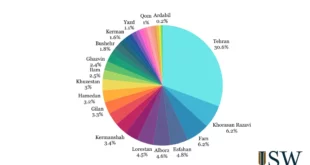 Secretary of the Popular Committee for the Reclamation of Iran’s Historical and Cultural Possessions said that the US is delaying the legal proceeding of the issue of the Iranian clay tablets because it has tied the case to international political issues. “Americans were seeking an excuse to prolong the case and they have now made the solution of the case with the clay tablets subject to the solution of Iran’s political issues,” Shahryar Aminian said.
Secretary of the Popular Committee for the Reclamation of Iran’s Historical and Cultural Possessions said that the US is delaying the legal proceeding of the issue of the Iranian clay tablets because it has tied the case to international political issues. “Americans were seeking an excuse to prolong the case and they have now made the solution of the case with the clay tablets subject to the solution of Iran’s political issues,” Shahryar Aminian said.
He continued, “Despite the fact that international conventions require the United States to return the tablets to Iran, the US refrains from doing so and they are behaving so adamantly that it is predicted that no date would be specified and announced for the next court session on the Iranian tablets.”
A US federal court ruling recently authorized putting to auction of ancient clay tablets dating back to the Achaemenid era.
The invaluable pieces which are relics of the magnificent Persepolis, seat of the Achaemenid Empire of ancient Persia, and bearing inscriptions in cuneiform, were smuggled to the US and were to be put up for auction under the court decision in favor of the survivors of a 1997 bombing of Jerusalem.
The auction’s expected proceeds of US$423.5 million would be paid to Israel.
Following the US Federal court ruling for the confiscation of Iran’s ancient clay tablets entrusted to Chicago University in 1945, Tehran decided to file a lawsuit against the verdict.
Iran and Chicago University had agreed on the returning of thousands of tablets and tablet-parts to Iran three years following the date they had been entrusted to the university.
Many of the ancient artifacts have been sent back to Iran, including 179 tablets in 1948, more than 30 thousand tablet-parts in 1951 and 300 tablets in 2004, while there still remain around 1000 more tablets in Chicago University.
The items are considered as part of Iranians’ national assets, and Chicago University admits Iran’s ownership.
Earlier Mashayee stressed that his country would resort to any legal means and actions to return the objects back home, saying that Tehran will hire a lawyer to file a lawsuit against the US federal court ruling.
Director of Iran’s National Museum Mohammad Reza Kargar has also stressed that the controversial clay tablets Iran had entrusted to Chicago University several decades ago will eventually return home.
Kargar told FNA that the case is now under legal procedures after some anti-Iran individuals strove to transfer the ownership right of the said tablets to their own benefit, arguing that they should receive the ownership right of the tablets as a compensation for the alleged losses Iran had inflicted on them.
“The court verdict which rules for the confiscation of the tablets in the interest of the claimant is viewed by the US State Secretary and US administration as principally baseless,” the official said, adding that the Islamic Republic government is currently pursuing the issue.
He also assured that the case will eventually end in favor of Iran and that the tablets will return home.
The National Museum Director also stated that two lawyers are now working on the case on behalf of the Iranian government and cultural heritage officials.
Earlier Aminian said that Iran’s clay tablets will undergo a scientific scrutiny as soon as Tehran reclaims them from Chicago University.
He said that the scientific department of his committee will work on the contents of the artifacts, which were entrusted to Chicago University 70 years ago, and stressed that the decoding of the contents of the tablets plays a crucial role in clarifying a major part of human civilization.
He also reminded that his committee has sent 80 e-mails to different world museums in order to garner their support for the return of the artifacts to its owner, Iran.
Museum of London has so far voiced its support for the return of a collection of clay tablets to Iran, he added.
 Eurasia Press & News
Eurasia Press & News


